#ovid's metamorphoses
Text

you are laughing, his dying head sunk into his shoulder like a broken flower and you are laughing
#de hyacinth#greek mythology#hyacinthus#apollo#art#illustration#the apollumi tag#apollumi#ovid's metamorphoses#metamorphoses#apollo x hyacinthus
648 notes
·
View notes
Text
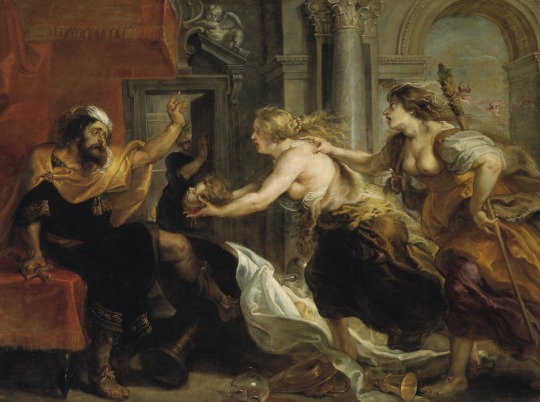
Tereus' Banquet (Tereus Confronted with the Head of his Son Itylus)
by Peter Paul Rubens
#tereus#art#peter paul rubens#macabre#banquet#greek mythology#king#thrace#thracian#itylus#philomela#procne#ovid's metamorphoses#ovid#metamorphoses#ancient greece#ancient greek#classical antiquity#tragedy#architecture#dinner#son#europe#european#mythology#mythological#macabre banquet
130 notes
·
View notes
Text
To every new person in the Greek myth fandom who shits on Athena because of what she did to Medusa....
Can y'all like..... Idk maybe NOT take Ovid's Metamorphoses as your ONLY source of Medusa's origin story?? (Furthermore that version isn't Greek either, it's Roman. So it's not Athena anyway, it's Minerva in that case).
And maybe like... Idk look at the GREEK myths (where Medusa didn't HAVE a traumatic backstory) that PRECEDE Ovid's version?? Would really not hurt you to look at and/or consider more than just one interpretation of the story.
PS: This is NOT to say that you CAN'T consider Ovid's version at all. You can, but atleast don't consider only THAT version to be canon. Cuz it's not. Myths like this don't follow a linear path. They are branched into several different versions. And cherry-picking only one of them while actively pretending the other versions don't exist at all is not gonna help you in your theological development.
#greek mythology#mythology#greek myths#ancient greek mythology#greek myth#greek myth retellings#ovid#ovid's metamorphoses#metamorphoses#medusa#athena#athena goddess of wisdom#greek gods#greek goddess#greek goddesses#ancient greek#greek god#minerva
158 notes
·
View notes
Text
no because literally, icarus is such an emotionally charged story. bro spends his life trapped, longing for escape, and when his father finally invents one, he struggles to maintain the perfect balance between the sky and the ground. even in his freedom, there are conditions, and they are arguably more limiting than those he endured during his captivity. not to mention the fact that his father's freedom is on the line as well. he's got so much riding on him, and little to no guidance on the matter
#greek mythology#mythology#ancient greece#ancient rome#ancient greek mythology#ovid#ovid's metamorphoses#homer#homer's odyssey#the odyssey#roman mythology#myth#icarus and the sun
114 notes
·
View notes
Text
I just want to clarify something: If you want to understand how Greek mythology and the Greek gods were represented and received from the Roman world onward, you NEED Ovid's Metamorphoses. For the Roman times, for the Middle-Ages, for the Renaissance, for the Modernity... ESPECIALLY for the Middle-Ages and the Renaissance since the Greek texts were either completely absent or really hard to obtain in these eras, unlike the Latin texts (such as Ovid's) which were everywhere and known by everybody. Ovid's Metamorphoses is, in this sense, a key element on how Greek mythology (but in truth Roman mythology in disguise) was shaped throughout Europe's popular culture and Europeans subconscious mind.
HOWEVER if you want to completely understand and thoroughly study Greek mythology in its - dare I say - "true" form, as in how it existed back in the times of Ancient Greece ; if you want to see and get how the Greek gods were seen and perceived by the Ancient Greeks themselves ; if you want to know the folktales and legends the Ancient Greek cities kept alive through their plays and their poems - do NOT use Ovid's Metamorphoses and get him the f*ck out of your mind, because Ovid did not play any part in actual Greek mythology, as he was a Roman man who wrote in Latin for a Roman audience, and went from simply slightly modifying some legends by mixing actual Latin/Roman religion-folklore in Greek traditions, to INVENTING ENTIRE GODS AND CHARACTERS OUT OF NOWHERE.
(Well not out of nowhere, to be fair, he always had a basis somewhere on late Greek myths or extrapolations of Greek texts - but he still invented a lot of things that then became somehow "canon" retrospectively to Greek mythology, but only through this new Greco-Roman mythology completely rebuilt and reshaped by the medieval and Renaissance authors, artists and scholars)
110 notes
·
View notes
Text

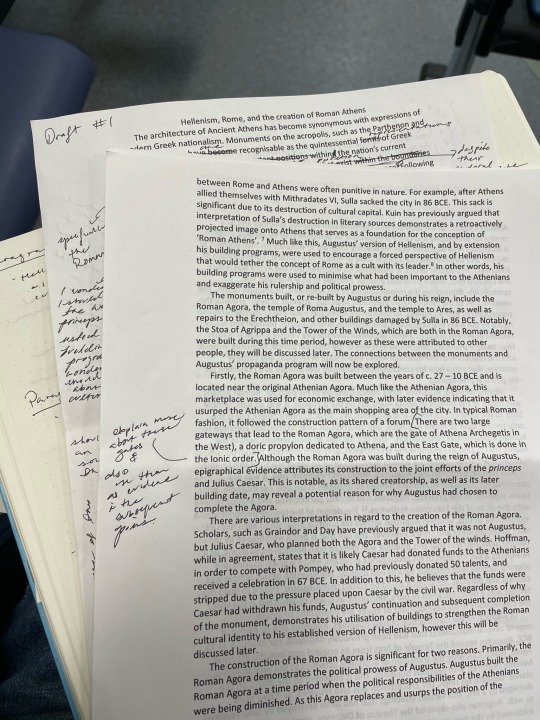
went to a starbies to work on my essay with a. few friends (don’t mind how bad it is — it’s my “shit draft!”), and then did some more work on the go.
#studyblr#classics#classics major#latin#study inspo#academia#dark academia#classics studyblr#latin translation#the secret history#ovid's metamorphoses#roman athens#archaeology#architecture#material culture#ancient athens#studying#study blog#study aesthetic#classics aesthetic#classics student
159 notes
·
View notes
Text
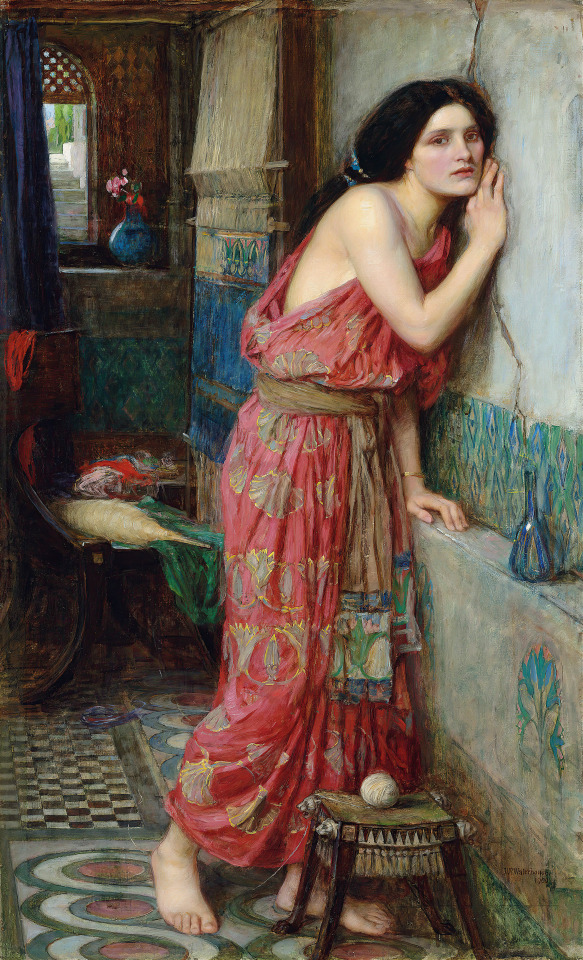
Thisbe
John William Waterhouse
#Thisbe#John William Waterhouse#mythology#roman mythology#painting#english art#british art#pre raphaelite#greek mythology#ovid's metamorphoses#literature#academicism
549 notes
·
View notes
Photo

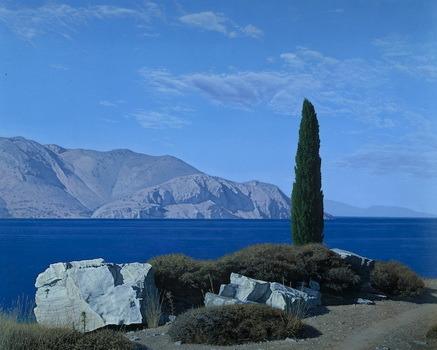


David Ligare | Landscape for Baucis and Philemon, 1984 | Classical Landscape, 1981 | Thrown Drapery, 1978 | Landscape with an Archer, 1991 |
#David Ligare#hyper realism#landscape#summer landscape#mythology#roman mythology#Baucis and Philemon#ancient rome#Ovid's Metamorphoses#symbolism#symbolic painting#20th century#20th century art#art#art history#painting#oil painting#oil on canvas
396 notes
·
View notes
Text
Myth
Ovid is the only acceptable version of the Orpheus and Eurydice myth. End of story (I’m serious though most others are ‘love is stupid he deserved it because love is dumb’). I’m posting it here instead of my main blog because… I get the vibe Anaïs read this version. Something about how lyrical it is, how we get the full song he signs to hades and Persephone and how fucking soul crushing it is? She must have read this one.

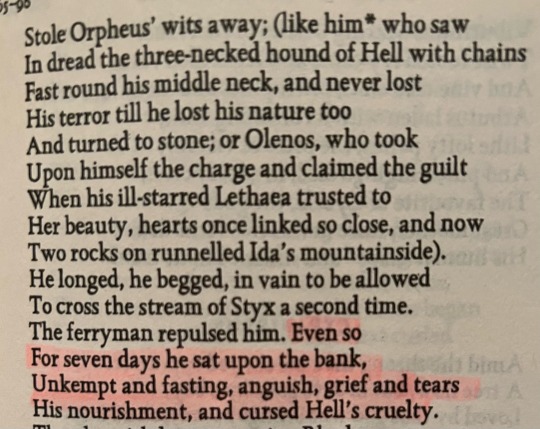
ALSO
There is a separate myth “the death of Orpheus” which, is absolutely. My heart cannot take it.


He’s the first to say they found each other in the end 😭
#hadestown#hadestown broadway#hadestown musical#orpheus hadestown#eurydice hadestown#orphydice#Orpheus#Eurydice#Greek mythology#ovid's metamorphoses#anaïs mitchell
372 notes
·
View notes
Text



From: Dior Autumn-Winter 2020-2021 Fashion Film
#screenshot#baucis and philemon#ovid's metamorphoses#greek mythology#fairycore#faerie#faecore#fantasy aesthetic#costume design#fashion#fashion photography#fashion film#dior#forest#woodland
31 notes
·
View notes
Text
Apollo in Love
Ovid, Metamorphoses I.512-524
“But ask after whom it is you please:
I am no mountain-dweller, I’m no shepherd;
I do not, hairy, keep watch here over herds
And flocks. Rash one, you do not know, you do not,
Whom you flee, and that is why you flee.
The Delphic land obeys me, Claros too,
And Tenedos, and the palace of Patara;
Jupiter’s my father; through me’s revealed
What will be, what has been, and what now is;
Through me songs make their harmony with strings.
My arrow’s sure, but there’s one arrow surer,
Which has made a wound within my empty breast.
Medicine’s my discovery, and I’m called
Help-Bringer throughout the world – the power of herbs
Has been set under me…alas for me,
That love cannot be cured by any herbs,
Nor are the arts that are a boon to all
Any boon to him who is their lord!”
"Cui placeas, inquire tamen. Non incola montis,
non ego sum pastor, non hic armenta gregesque
horridus observo. Nescis, temeraria, nescis
quem fugias, ideoque fugis. Mihi Delphica tellus
et Claros et Tenedos Patareaque regia servit,
Iuppiter est genitor; per me quod eritque fuitque
estque patet; per me concordant carmina nervis.
Certa quidem nostra est, nostra tamen una sagitta
certior, in vacuo quae vulnera pectore fecit.
Inventum medicina meum est, opiferque per orbem
dicor, et herbarum subiecta potentia nobis:
ei mihi, quod nullis amor est sanabilis herbis
nec prosunt domino, quae prosunt omnibus, artes.”
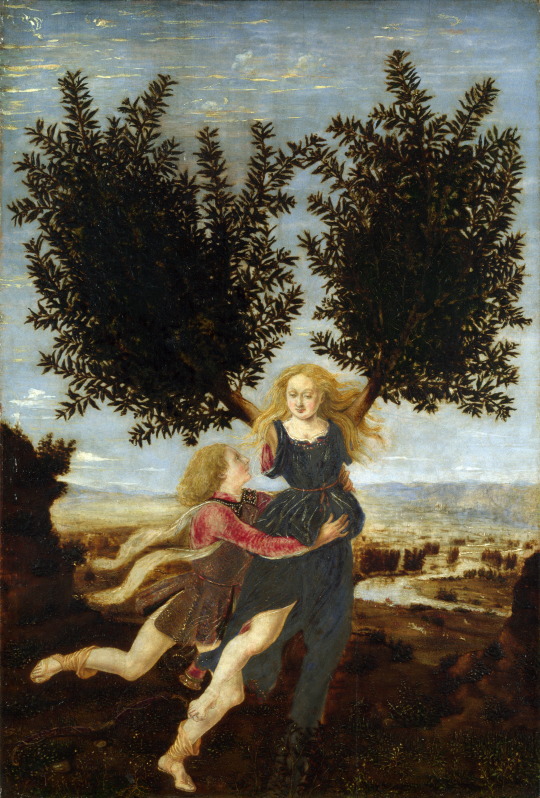
Apollo and Daphne, Piero del Pollaiolo, 1470s
#classics#tagamemnon#Latin#Latin language#lingua latina#translation#Latin translation#poem#poetry#poetry in translation#Latin poetry#Roman poetry#Ovid#Metamorphoses#Ovid's Metamorphoses#dactylic hexameter#Apollo#Apollo and Daphne#Piero del Pollaiolo
190 notes
·
View notes
Text

Lily is wondering whether there are any cats in The Metamorphoses!!
22 notes
·
View notes
Text
Loved learning last week that Morpheus, god of dreams, only appears in one classical source: The Metamorphoses.
Which isn’t Greek myth, but a collection of stories based on Greek myths by Ovid, a Roman writer.
So The Sandman making Morpheus a whole thing is like if someone made art in a thousand years treating Percy Jackson as a part of Greek mythology.
#greek mythology#ovid#ovid's metamorphoses#the sandman#morpheus#percy jackson#percy jackson and the olympians#pjo
36 notes
·
View notes
Text
hello i'm asking the hivemind for opinions on translations of The Metamorphoses. which one should i aim to get for my first reading?
#ovidposting#ovid's metamorphoses#classics#for context: my academic focus is epic over the ages and im looking for a challenging/rewarding read but i am not a latinist#so a nice critical edition is cool too
58 notes
·
View notes
Note
So…I followed your advice in researching Greek Myths and learning them via the Authors. And uhm…I was curious because something bugged me.
Now I’m bad at history, but as far as I knew, Laurel Wreaths were mostly common in Rome, rather than Greece? (I could be wrong) so I had like a nagging feeling. And found out that the Daphne and Apollo myth (And probably also Hyacinthus I’m looking into that) was told in Ovid’s Metamorphosis? I could be wrong, so far I’ve only seen Ovid as the original author.
Sorry- I saw your post about Arachne and thought about what other myths were originally purely Roman then were mistaken for Greek Myths and wanted to add this into a possibility-
A LOT of stuff were invented by Ovid! Myself I learned only a month ago that Morpheus was "invented" by Ovid and I was like... wow. (There were dream-gods in Greek mythology, but they were not singularized, and the persona of Morpheus as the individual god of dreams was invented by Ovid)
Now, I don't know much about the specific use of laurel in Ancient Greece vs the Roman empire, but if you ask about the origin of the story of Daphne and Apollo, they are definitively Greek and Ovid did not invent her (though he told the story in a very, very different way).
The story of Daphne's numerous misadventures was recorded by Greek authors - and while it was quite late records, which would make us wonder if it isn't a late development or invention, they all rely on older sources attesting a presence of Daphne's legend for quite a long time. The two major records of Daphne's legend by Greeks are Pausanias' Description of Greece (2nd century CE), and Parthenius of Nicea's "Erotica Pathemata" (1st century BCE). BUT Pausanias explains that the legend he collects has been known for a very long time in the area around the Ladon river, to the point of implementing itself within the worship of Apollo, while Parthenius begins his story by pointing out he is merely retranscribing the text of older sources - a book from a 3rd century BCE historian named Phylarkhos, and an elegiac poem by Diodoros of Elaia. But given these two older texts were lost, we only have the latest record, hence this feeling of "novelty" when the story is actually at least around since the 3rd century BCE...
In fact, the existence of Daphne in Greek mythology long before Ovid's Metamorphoses is also proven by how massively different the Greek records of Daphne's life are from Ovid's tale. Everybody knows the story of Daphne through Ovid, since it was the most popular and widespread one... But both Pausanias and Parthenius report the same legend, which is very different from Ovid's rewrite.
In Ovid's tale, Daphne is said to have been Apollo's first love, and that the god's feelings were caused by Cupid as a way to take revenge after being mocked (Apollo, as a talented archer-god, mocked Cupid's own archery talents). Cupid shot a love-killing arrow in Daphne's heart so that the nymph would reject all forms of love, and she became "like Diana" - by refusing any form of marriage or romance, and fleeing the company of men and rejecting all her suitors, preferring the loneliness of the woods and the pleasure of the hunt - her father, the river-god, insisted on her giving him a son-in-law and grandchildren but she insisted she wanted to remain endlessly virgin like Diana. Meanwhile Apollo had received a love-inflamming arrow, one that not only caused a deep desire and mad love within the god for Daphne, but also made this attraction stronger and more obsessive each time the god saw the nymph. As such, Apollo tried all he could to please her and woo her and seduce her, but each time he tried the love-repelling spell on Daphne caused her to flee in fear and disgust and terror ; and the more she fled, the more Apollo found her beautiful and desirable, thanks to Cupid's curse ; and thus he followed her, but the more he pursued and insisted the more she fled. Their respective love and hate kept growing and growing until Daphne, exhausted and not wanting to flee anymore, stopped by the shore of her father the river-god and begged him to transform her so that her beauty would be gone, and she would not be loved anymore. Her father turned her into a laurel-tree, but it was no use, as Cupid's power as too strong: Apollo was still in love with the beauty and radiance of the tree, and he could feel Daphne's heart beating in the plant; and similarly Daphne's hate still lived on, as when Apollo embraced the tree and kissed its branches, the tree shivered and was repelled away from the god's body. But Apollo ultimately decided that if she could not be his bride, he would make Daphne his official tree and symbol - and to this, Daphne actually agreed as she offered her "leafy branches" to the god.
That's the Roman story of Daphne invented by Ovid. What is the difference with the Greek story he took inspiration from? (Because it is very clear that Ovid's source was the story twice told by Pausanias and Parthenius ; and told by others before whose name were lost...
1: In Ovid's story, Daphne simply admires and imitates Diana's behavior. In the Greek legend Daphne was ACTUALLY one of the huntresses of Artemis. Or to be more precise Parthenius explains that Artemis found Daphne "dear" to her because she shared the goddess' life-choices, refusing to live in cities, not hanging out with other girls, hunting in the mountains with a large pack of hounds... And Artemis loved Daphne so much she offered her a gift: she would always shoot straight at her target and never miss.
2: There's no Cupid/Eros in the Greek legend. Daphne is not Apollo's first love, she is not cursed with rejecting all love, he was not cursed to love her to insanity - this whole episode was invented by Ovid. Apollo is still in love with Daphne in the Greek legend, but it is just a regular love.
3: The Greek legend has a character that Ovid completely erased. Leucippus. Leucippus was another man who was in love with Daphne but knew that she was a lonely huntress closely linked to Artemis... Understanding he could not seduce her in a conventional way, Leucippus put up a convoluted plan to win the girl's heart. He dressed himself as a woman and created for himself a female persona. He approached Daphne and pretended to be a fellow huntress ; Daphne agreed to let her join her hunting party, and she soon grew to admire this bold, strong woman so unlike the other girls of Greece and whose strength and hunting talents far surpassed those of a common maiden... In fact she grew such affection and admiration for the fake-huntress that Daphne developed a dear and solid friendship with her: it was said she was always by Leucippus' side, refused to let Leucippus away from her, and kept embracing him/her and clinging to his/her body. However, since Apollo was also in love with Daphne he grew both jealous and angry (since, as the god of truth, he knew of Leucippus' deceit), and decided to reveal the truth. He implanted in Daphne's mind the idea that she had to bathe in a given stream: she went there with her "attendant maidens" and female servants/fellow huntresses (Daphne is never said explicitely to be part of the huntresses of Artemis, but she herself lives in a group of "wild women" very similar to Artemis' huntresses so... it is strongly implied she is one of them, especially since she literaly lives like the goddess and has been gifted by her). Leucippus of course refused to bathe, despite the other girls' insistence, and since he refused still, they tore his clothes away from him... discovering he was a man all along. And since this group of women act on a Artemis' huntress logic, they did what seemed the most reasonable thing to do... kill Leucippus by plunging in his body all of their spears.
4: The Greek legend does agree that Daphne begged a third-party god to turn her into the laurel tree to escape Apollo's love-hunt, but the details are different from Ovid's tale and the story is more lacking in explanations... All we know, from Parthenius' record is that Apollo appeared to Daphne right after Leucippus was killed. Why? We don't know, but he clearly came to profit off the fact his romantic rival had been killed in shame/crime, and that he had a part to play in the "reveal" of Leucippus' deceit... But all we know is that Daphne fled Apollo, and he pursued her, and to avoid being caught by him she begged to be hidden from his sight, and thus she was turned into a laurel tree. But in the Greek legend she doesn't beg her father the river-god... she begs Zeus, and he is the one who grants her request and protects her from his own son.
Things are even worse in Pausanias' record, since he stops after Leucippus death and there is no story of Apollo hunting down Daphne in any way... He doesn't even speak of any metamorphosis ; and yet he does mention that Daphne was associated with the laurel, and that the heavy use of laurel in Apollonian rituals and games was because of the god's love for Daphne. (But from yet other sources contemporary to Pausanias' writings, such as the "Life of Apollonius of Tyana", we know that the story of Daphne being somehow "replaced" by a laurel-tree was well-known, though it wasn't always said why such a thing happened)
In conclusion, as usual with how Ovid tweaks the Greek legends, it is interesting to see how he shift the character and what the character is supposed to be about. Thanks to Ovid the image we keep of Daphne is the one of a victim fleeing in fright and fear, and her relationship with Apollo is depicted as a frightening and cruel tragedy orchestrated by Cupid... And yet, we do know that Daphne started out as a badass huntress of Artemis, and that her original story was about a man changing his gender in hope of winning her heart - to the point the involvment of Apollo was seen as a side-detail that could be omitted (Pausanias even claims that Apollo's involvment in the legend was an addition by the priests of the god, and not present in the main folktale)
Mind you I am not at all an expert on Daphne's character or story - and I am sure others are more informed than me... But that's the few things I know
21 notes
·
View notes
Text
Botanic Tournament : Greek Mythology Poll !
Leuke (also written Leuce) means white, especially white poplar
Hyacinthus (also Hyacinth)
Kalamos (-> Calamus) means reed
Myrrha
Narcissus
The two options with the most votes will join the main bracket
#botanic tournament#tournament polls#greek mythology poll#why am i doing this one i already know which ones the majority is going to vote for#greek myths#greek mythology#metamorphoses#ovid's metamorphoses#leuke#leuce#hyacinthus#kalamos#calamus#myrrha#narcissus
75 notes
·
View notes